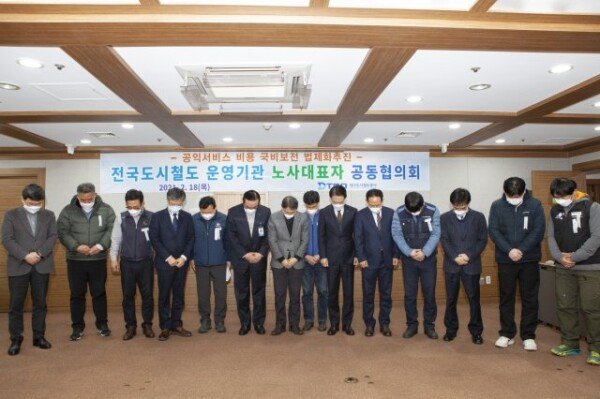For the sixth year, the rate remains the same, and the proportion of the population over 65 is increasing, suffering a chronic deficit due to free transportation.
In addition, the number of passengers has decreased by 25% from a year ago due to Corona 19, and there is a great sense of crisis that it is a real’door to close’.
According to the Seoul Metropolitan Government on the 20th, last year, the Seoul Transportation Corporation’s net loss was 1,954 trillion won, an increase of 508.9 billion won from the previous year. The Transportation Corporation is suffering a serious financial crisis with a deficit of over 1 trillion won last year. An official from the Seoul Transportation Corporation said, “Because of lack of liquidity funds, we delayed the payment of incentives to employees according to the management evaluation of public companies last year.” “We issued 900 billion won (CP) for various construction costs, etc. It is a situation.” Seoul subway fares have been in a state of’required floating’ for the sixth year since the adjustment in June 2015. According to the Seoul City Ordinance, public transportation fare increases are to be promoted every two years, but each fare increase has been postponed due to the political burden of the local government head.
The current subway fare is 1,250 won, while the transport cost per person is 2061 won, which is a deformed structure that increases the deficit as it runs.
The Seoul Metropolitan Government and the Transportation Corporation held a discussion meeting in the second half of last year and promoted a rate increase saying,’We need to adjust rates regularly to reflect inflation and labor costs, etc.’
The construction side appeals to the Corona 19 government that the government’s preservation is more urgent than ever, in a situation where it is difficult to adjust rates that can increase the burden of common people.
Among the causes of the financial deterioration of urban railroads, free transportation of the elderly over the age of 65 accounts for the highest proportion. As aging accelerates, the burden of losses from free transportation is increasing.
The Korea Railroad Corporation (KORAIL) under the Ministry of Land, Infrastructure and Transport receives approximately 60% of the loss each year, and the cost of public service for transportation is solely the responsibility of local governments.
A Seoul City official said, “Is it not reasonable that the free subway transportation for the elderly 65 years or older is a national level of welfare, and the government has to bear some of the costs for this?”
The labor and management of six urban railroad operating institutions nationwide, including the Seoul Transportation Corporation, gathered in Daegu on the 18th and urged to preserve national funds. Labor-management representatives were very concerned about the current situation, saying, “If it is like this, safety accidents caused by financial shortages cannot be avoided.”
The six metropolitan railroad operating organizations strongly requested that the operating loss due to COVID-19 be reflected in the ‘4th Government Disaster Subsidy’ currently being discussed in addition to the preservation of national expenses.
Of last year’s Seoul Transportation Corporation’s net loss of 1.95 trillion won, the loss due to Corona 19 was 492 billion won, accounting for 45%.
An official from the Seoul Transportation Corporation said, “We are strongly requesting the government to preserve the national expenditure with the desperate feeling that the door may really close.
(Seoul = News 1)
Copyright by dongA.com All rights reserved.
—
–


